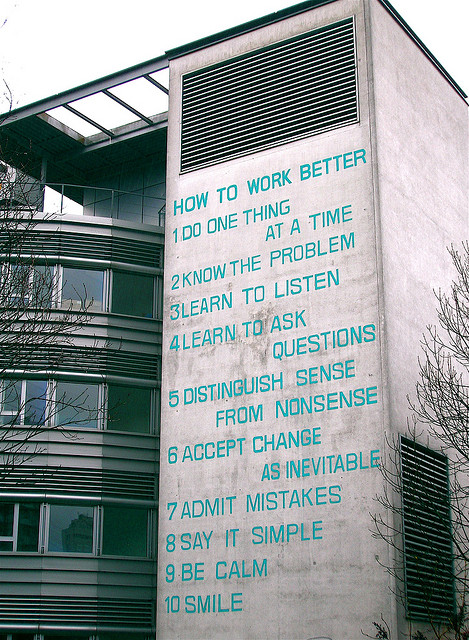Simple processes need case workers too
Reducing errors with end-to-end responsibility 2014-07-24 #BPM
I had a bad experience at a cafe in the City of London a couple of days ago: I ordered a coffee at the counter, the waitress said that she’d ‘bring it over’, but then it never came. I asked where my coffee was, after 15-20 minutes of coffee denial, and the last two steps were repeated: she said she’d ‘bring it over’, it never came. On a more positive note, their process went wrong in an interesting way.

Their coffee provision process (diagram) doesn’t seem to be complicated. I ordered and paid for the coffee, and the person who served me took my name. As far as I could tell, the plan was that someone would then make the coffee and someone else would bring it to me.
There were indeed several staff who seemed to share the work of taking orders, making coffee and taking coffee to tables (just not mine). Unfortunately, the one who distributed my coffee gave it to the wrong customer, who presumably neglected to report that they hadn’t ordered it. Asking for a status update didn’t help, and only when I later cancelled the process and asked for my money back did they work out what had happened. I did get my money back, an apology (this isn’t the Netherlands), and a voucher for a free coffee.
Case workers
While I was waiting for coffee, I just happened to be reading about case workers in the book Business Process Management - A Rigorous Approach (really!). The author describes how even simple processes can run into problems when people working in different roles work on on different parts in the process, just as I was experiencing at the time. He writes:
Many traditional production line industries have, for many reasons including motivation, moved away from the bucket chain approach and introduced ‘case workers’ who take responsibility for the entire handling of a case
Ironically, this case worker approach is nothing new in cafes. The coffee process failure I experienced would not have happened in an old-school Parisian café, such as La Palette (photo, above), where the waiter who takes your order also brings it to your table, and is far less likely to give the coffee to someone else. Possibly by the simple expedient of remembering what you look like.
When cafe staff take end-to-end responsibility for a set of tables, service is better. I dread to think that so many cafes (outside France) might be assigning different tasks in the name of some kind of efficiency. The more likely reality is when someone brings you the wrong order it’s a surprise to them, because they weren’t there when you asked for something else. Instead of efficiency, this results in what is called ‘failure demand’ - additional work to correct mistakes. Similarly, the Business Process Management book has a case study of a large organisation’s infrastructure services help desk: the number one complaint in the case study like the annoyance of having a cafe employee collecting glasses who won’t take your order:
When I make a service call, don’t bounce me from person to person
If you’re thinking about enterprise business process management at this point, then you’re probably dealing with processes that are more complex than getting me a coffee. This includes things like hospital patient management, or making an insurance claim. These processes are no less likely to benefit from a case-worker approach, who can provide a single point of contact. Perhaps more importantly, focusing on one case at a time prevents delays and backlogs due to batching. Delaying cases at one stage in the process because someone wants to do several tasks in a batch increases the total cycle time and most likely introduces overheads of scale, because handling ten cases requires more management than handling one at a time.
Do one thing at a time
If you squint a little, the first instruction of the artwork How to Work Better (‘do one thing at a time’, below) is about case management, and good advice for people working in both cafes and large service organisations. So is number 10 - ‘Smile’.



